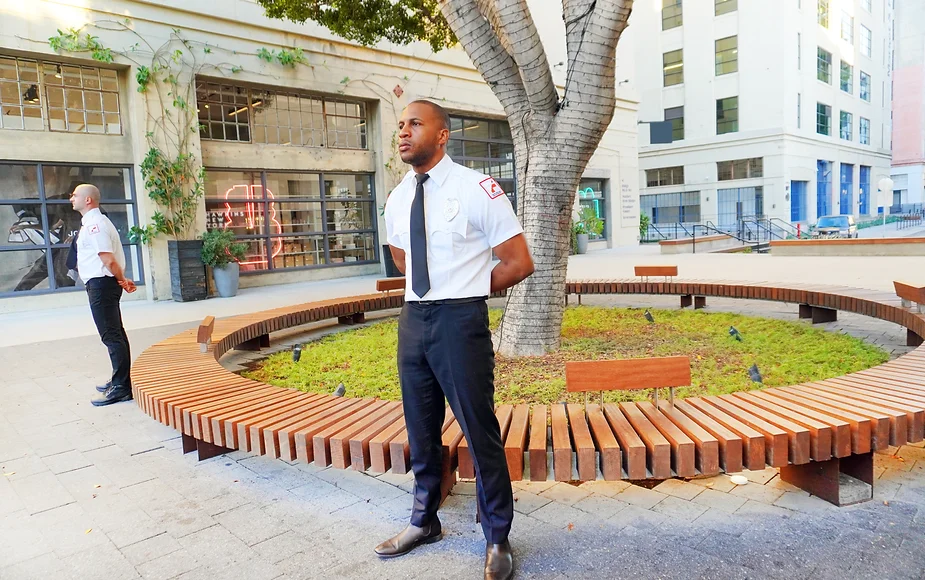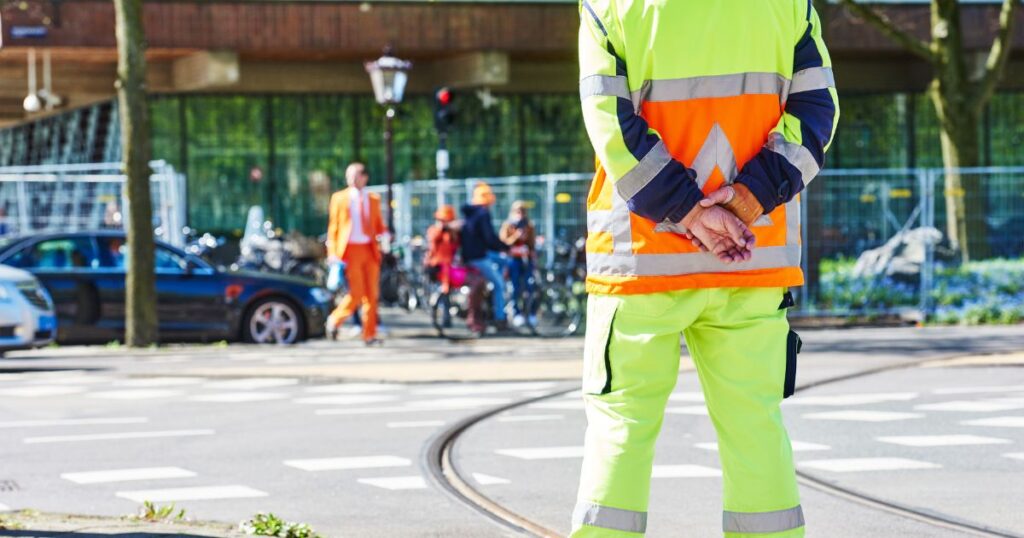Security guards play a crucial role in ensuring the safety and security of people and property in California. They are the vigilant sentinels who watch us in various settings, from shopping malls and office buildings to events and residential communities. But have you ever wondered about the extent of their authority and what lies within the boundaries of their responsibilities? In the diverse and dynamic state of California, understanding the role of security guards is essential for their effective operation and the safety and rights of the public they serve.
In this blog, we will delve into the fascinating world of security guards and explore what security guards can and can’t do in the California. We’ll uncover the legal framework governing their actions, examine real-life scenarios demonstrating their roles, and shed light on the critical training and oversight required to balance security and civil liberties. So, whether you’re a security guard looking to better understand your responsibilities or a concerned citizen interested in knowing your rights, join us on this informative journey through California’s security world.

Responsibilities Of Security Guards
Security guards in California shoulder a range of primary responsibilities to maintain a safe and secure environment. These duties are instrumental in safeguarding people and property while preventing and responding to security threats.
Visible Presence
Security guards are often seen as a deterrent to potential wrongdoers simply by their presence. Their visibility alone can discourage criminal activities and contribute to an overall sense of safety. Their reassuring presence can be a powerful tool in crime prevention in public spaces like shopping centers and events.
Access Control
One of the fundamental tasks of security guards is controlling access to a location or building. They check identification, enforce visitor policies, and monitor entrances and exits. This function helps ensure that only authorized individuals gain entry, reducing the risk of unauthorized access and potential security breaches.
Criminal Activities
Security guards are trained to detect suspicious behavior and respond appropriately. Their vigilance helps deter potential criminals who may think twice before engaging in illegal activities when they see a security presence. This proactive approach can significantly reduce incidents of theft, vandalism, and other crimes.
Emergencies
In times of crisis, security guards are often the first responders. They are responsible for sounding alarms, notifying emergency services, and helping to evacuate people safely. Their role is critical during natural disasters, fires, medical emergencies, or situations threatening safety.
These primary responsibilities illustrate the foundational role of security guards in maintaining a secure and orderly environment. By fulfilling these duties, they protect property and individuals and contribute to the overall well-being of the community they serve.
What Security Guards Can Do
While understanding what security guards can’t do is essential, it’s equally important to recognize their legitimate authorities and responsibilities within the boundaries of California law. Security guards play a pivotal role in maintaining safety and order, and knowing what they can do is vital for both their effectiveness and public awareness.
a) Detaining Individuals for Questioning
Security guards have the authority to detain individuals for questioning when they have reasonable suspicion of criminal activity or a breach of the premises’ rules. This temporary detention allows them to assess the situation, identify potential threats, and protect the property’s and its occupants’ safety.
b) Using Reasonable Force When Necessary
Security guards are permitted to use reasonable force, but only when it is necessary to maintain order or protect themselves, others, or the property they are assigned to safeguard. The use of force should always be proportionate to the threat and in compliance with the law. Security guards receive training to determine when and how to apply pressure judiciously.
c) Communicating with Law Enforcement
Security guards often serve as a liaison between the public or property owners and law enforcement. They can contact and cooperate with local police or emergency services when a situation requires their intervention. This communication is crucial for the swift response to incidents and emergencies.
d) Providing Assistance to the Public
Security guards are expected to assist the public with general inquiries, directions, and guidance when necessary. They can offer assistance during non-emergency situations and help create a welcoming and secure environment for visitors and patrons.
Understanding these responsibilities and authorities is essential for security guards to effectively perform their duties, ensuring the safety and security of the premises they protect. It also enables the public to be aware of the support and assistance they can expect from security personnel when needed, fostering a sense of security in various environments.

What Security Guards Can’t Do
Security guards in California have defined roles and responsibilities, but it’s equally important to understand what they cannot do within the boundaries of their authority. Knowing these limitations helps maintain a balance between security and individual rights.
a) Making Arrests Without Proper Authority
Security guards do not possess the same arrest powers as law enforcement officers. They can detain individuals for questioning and to prevent disturbances, but they should never make formal arrests without proper authorization. Formal arrests are typically the responsibility of law enforcement officers who have the legal authority to do so. However, security guards can assist by detaining a person until the police arrive.
b) Carrying or Using Firearms Without Permits
In most cases, security guards in California are not authorized to carry or use firearms unless they have obtained the necessary permits and training. The process of acquiring such permits is stringent, requiring background checks and specific training in the safe use of firearms. Using a firearm without proper authorization is a severe violation of the law and can result in both legal and professional consequences.
c) Engaging in Vigilantism or Excessive Force
Security guards must use reasonable force when necessary to protect themselves or others and to maintain safety and security. However, they are not permitted to engage in vigilantism, take the law into their own hands, or use excessive force. Using excessive force or engaging in vigilantism can lead to legal consequences and the loss of their security guard license. California law strictly regulates the use of force by security personnel, emphasizing the importance of restraint and professionalism.
d) Acting Outside Their Scope of Employment
Security guards are hired to perform specific tasks and duties outlined by their employer, such as monitoring a particular area, checking credentials, or maintaining order. Acting beyond the scope of their employment, such as conducting personal investigations or pursuing unauthorized activities, is prohibited. It’s essential for security guards to adhere to their job descriptions and responsibilities, which are set by their employers and within the confines of the law.
Legal Framework in California
The roles and responsibilities of security guards in California are not arbitrary; they are defined and governed by a specific legal framework. These regulations are in place to ensure that security personnel operate within the boundaries of the law while maintaining safety and security.
In California, state laws and regulations set the standards for the private security industry. These laws dictate the licensing and training requirements for security guards and the legal scope of their authority. The Bureau of Security and Investigative Services (BSIS) is responsible for enforcing regulations related to security and investigation in the state. Security guard training programs, background checks, and licensing procedures are designed to ensure that individuals entrusted with the role of security guards are qualified and prepared to handle their responsibilities effectively and responsibly.
Security guards must be aware of and adhere to these legal requirements. Any violation of these regulations can result in legal consequences, including loss of their license to work as a security guard. Additionally, these laws protect the rights of individuals and ensure that security personnel do not overstep their authority.
FAQs: Security Guard Authority
Q1: Can Security Guards Ask For Identification?
A1: Security guards can request identification if they have reasonable suspicion of criminal activity or a breach of property rules.
Q2: Can Security Guards Remove You From Private Property?
A2: Yes, security guards can ask you to leave private property if you violate rules or laws. Refusal may lead to law enforcement involvement.
Q3: Can Security Guards Talk To You And Ask What You’re Doing?
A3: Yes, security guards can engage in conversation and ask about your activities if it’s related to their responsibilities for property safety.
Q4: Can Security Guards Do Anything To You Off-Site?
A4: No, security guards generally don’t have authority off-site. Their powers are limited to the premises they protect.
Q5: Can Security Guards Search You?
A5: Security guards can’t typically conduct searches without your consent. Law enforcement handles inquiries that require legal authority.
Conclusion
Understanding the roles and limitations of security guards is crucial for ensuring safety and order in California. Frontline Guards, your trusted partner, provides licensed security services that operate within the legal framework. Whether it’s access control, deterrence of criminal activities, or emergency response, our team is committed to maintaining safety while respecting your rights.
Don’t compromise on security. Contact Frontline Guards today and take the first step toward peace of mind. Your safety is our priority, and we’re here to safeguard your needs professionally and in compliance with the law.




